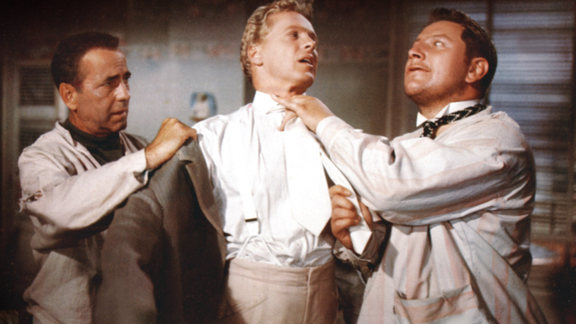
We’re No Angels (1955) was one of Humphrey Bogart’s last movies. It’s a rare showcase for his often overlooked talents as a comedian. Bogart always had a humorous line or two in his patented tough guy roles but he really did excel at light comedy.
We’re No Angels opens on Christmas Eve, 1889, on Devil’s Island in French Guiana three convicts escape (Humphrey Bogart, Peter Ustinov, and Aldo Ray) prison and end up seeking refuge with the Ducotel family. The three escapees offer to do a few repairs around the shop with the intention of robbing the good natured Ducotel’s after dark but gradually the convicts become invested and entangled in the dramas of the household with rather lethal results.
As a light comedy with morbid underpinnings We’re No Angels has a lot in common with Arsenic And Old Lace (1944). Though a better crafted film Arsenic And Old Lace avoids the moral ambiguities of We’re No Angels as well as a clear villain. The three convicts in We’re No Angels essentially function in much the same way as the Brewster sisters in Frank Capra’s film. So the villain of We’re No Angels comes instead from outside in the form of Basil Rathbone’s character Cousin Andre. The appearance of Cousin Andre unites the criminals and the Ducotels against a single front while further blurring their moral boundaries.
Ranald MacDougall’s script for We’re No Angels is essentially a domestic comedy. However the addition of the convicts complicates matters by creating a juxtaposition of moralities. The amoral criminals mix and mingle with the moral Ducotels till a kind of synergy occurs where some of the amorality of the “bad guys” rubs off on the Ducotels and vice versa. This becomes especially apparent in the scenes dealing with sexuality that involve Amelie Ducotel (Joan Bennett) and Isabelle Ducotel (Gloria Talbott).
We’re No Angels was based upon a stage play by Bella and Samuel Spewack and wears its theatrical roots on its sleeve. Director Michael Curtiz does little to add any visual flare or nuance to the proceedings, preferring medium and wide shots that isolate the two social groups (the criminals and the Ducotels). This is effective for the most part but becomes common place due to a lack of variety in the visuals.Similarly the dramatic beats in We’re No Angels tend to repeat without any intervention on Curtiz’s part to speed up the proceedings so that the repetition goes unnoticed.
